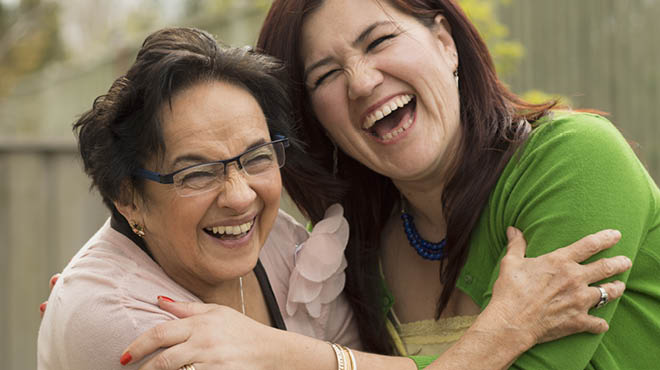Posted By

Katie Casper, M.D.
Birthing Centers, Obstetrics & Gynecology (OB-GYN), Prenatal Care

Tarek Khalife, M.D.
Birthing Centers, Obstetrics & Gynecology (OB-GYN), Prenatal Care
Recent Posts
Menopause: A natural part of aging

The average age for menopause in the U.S. is 51. For some women, menopause can be challenging, but a greater understanding of the symptoms and treatments can help smooth this natural transition.
Here are answers to common questions women have about menopause:
How do I know if what I'm experiencing is menopause?
Menopause is defined as the permanent cessation of menstrual periods. It's triggered by a natural decline in female hormones released by the ovaries, surgical removal of the ovaries, lack of sufficient reproductive hormones, or sometimes by chemotherapy and radiation therapy. A woman has officially entered menopause after she hasn't had her menstrual period for 12 consecutive months.
Some women confuse perimenopause with menopause. Perimenopause generally begins years before women reach menopause and can include irregular menstrual periods and other common menopause symptoms.
What are the symptoms of menopause?
Aside from the end of menstruation, some women have no additional symptoms. For others, symptoms may include:
- Decreased libido
- Hot flashes
- Irregular or missed menstrual periods
- Mood swings or changes
- Night sweats
- Painful sex
- Sleep disturbances
- Thinning hair
- Weight gain
Do all women have hot flashes during menopause?
Not all women undergoing menopause suffer through hot flashes.
These factors have been associated with increased incidence of hot flashes:
- Ethnicity — more African American women report hot flashes than those of European or Asian descent
- Lack of exercise
- Obesity
- Smoking
Not all women experience hot flashes with menopause, but for some women, the hot flashes can be severe. Jennifer Bantz, M.D. explains why hormone replacement therapy can help manage symptoms:
Are there any health risks associated with menopause?
A woman's risk for these chronic medical conditions can increase after menopause:
- Cardiovascular disease
The decline in estrogen increases the risk of heart attack and stroke. - Osteoporosis
During the first few years after menopause, women may rapidly lose bone density, leading to an enhanced risk for bone fractures. - Genitourinary syndrome of menopause
As vaginal tissues lose elasticity, and becomes thin and dry, women may struggle with pain during intercourse. The urethra also becomes dry and irritated, which may increase the risk of infection. Some women may need to urinate more often and may experience leakage, also known as urinary incontinence. - Weight gain
Because of the decrease in basal metabolic rate after menopause, women may need to decrease caloric intake and increase exercise to maintain their weight.
Are there treatments for menopause?
Contemporary treatments focus on relieving any symptoms of menopause that may be disruptive and assessing current or potential chronic medical conditions. Women should speak with their health care team about risks and benefits related to treatment options, which may include hormone replacement therapy or nonhormonal remedies.
Some women notice pelvic floor issues during menopause, such as an overactive bladder or urinary incontinence. Others may experience vaginal dryness or irritation. Many options are available for treating these bothersome and sometimes embarrassing problems.
For some women, lifestyle changes can manage bladder problems, such as limiting the amount of caffeine they drink or scheduling regular trips to the bathroom. For other women, physical therapy or biofeedback is effective. Some women may benefit from topical vaginal lubricants or moisturizers.
What lifestyle modifications can I make to ease the transition of menopause?
Women may also find relief through lifestyle changes, such as:
- Eating a balanced diet that limits saturated fats, oils and sugars. For some women, hot flashes may be triggered by hot beverages, spicy foods or alcohol.
- Exercising a minimum of 30 minutes per day at a moderate intensity level.
- Incorporating relaxation techniques, such as deep breathing, guided imagery, progressive muscle relaxation and yoga.
- Layering clothing to accommodate body temperature changes.
- Optimizing sleep by avoiding caffeine and exercising earlier in the day. Aim for getting seven to nine hours of sleep each night.
- Quitting smoking.
Menopause is a normal life change and a natural part of the aging process. Treatment should be individualized and based on a woman's symptoms. Women should discuss the risks and benefits of treatment options with their health care team.
Katie Casper, M.D., and Tarek Khalife, M.D., are OB-GYNs in Mankato, Minnesota.




